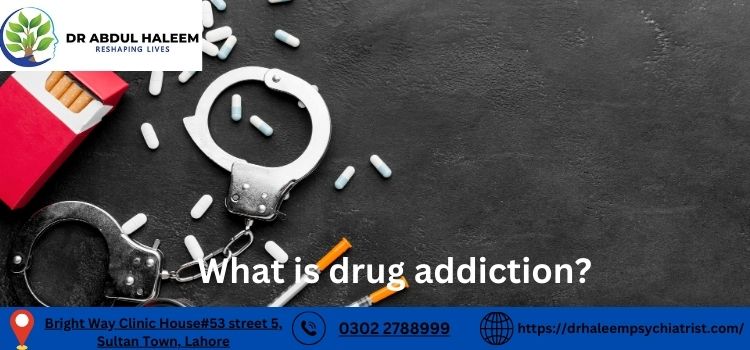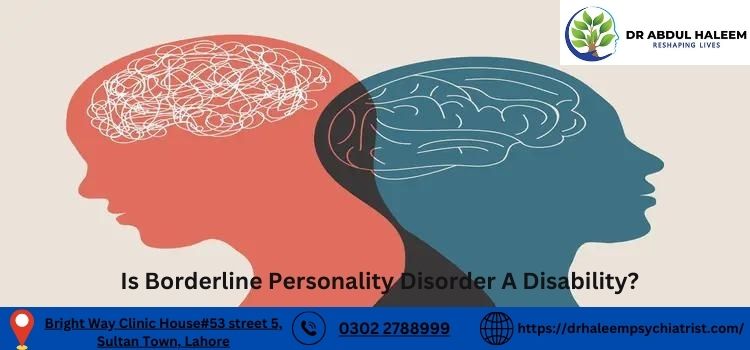The most common question that people ask is What is drug addiction? Drug addiction, also known as substance use disorder, is a chronic disease characterized by compulsive drug seeking and use despite harmful consequences. It is considered a brain disorder because drugs can change the structure and function of the brain, leading to intense cravings and difficulty controlling drug use.
In this blog post, we will discuss the causes of drug addiction, its effects on individuals and society, and possible treatment options.
Let’s dive in to get more details.
What is drug addiction?

Drug addiction is a chronic disorder characterized by compulsive drug seeking, use, and craving despite harmful consequences. It is considered a brain disease because drugs change the structure and function of the brain, making it difficult for individuals to control their substance use.
Addiction can develop from various factors, including genetic predisposition, environmental influences, and individual vulnerabilities. The initial decision to take drugs may be voluntary, but repeated use can lead to changes in the brain that result in intense cravings and a loss of control over drug use.
Causes of drug addiction
There is no single factor that can cause a person to develop an addiction to drugs. It is usually a combination of genetic, environmental, and social factors that contribute to the development of drug addiction.
Genetics play a significant role in an individual’s susceptibility to drug addiction. Studies have shown that genetics can account for about 40-60% of a person’s risk for developing drug addiction. This means that people with a family history of drug addiction are more likely to develop an addiction themselves.
Environmental factors also play a crucial role in the development of drug addiction. These include stress, trauma, peer pressure, and exposure to drugs. Individuals who experience early childhood trauma or have a history of mental health issues are more vulnerable to developing an addiction.
Social factors, such as family dynamics, can also contribute to drug addiction. Children who grow up in households where substance abuse is prevalent are at a higher risk of developing an addiction themselves.
Effects of drug addiction
Drug addiction can have severe consequences on an individual’s physical, mental, and social well-being. It can lead to various health problems, including heart disease, liver damage, and respiratory issues. It also increases the risk of contracting infectious diseases such as HIV/AIDS and hepatitis.
Mentally, drug addiction can cause mood disorders, anxiety, depression, and even psychosis. It can also impair judgment and decision-making abilities, leading to risky behaviors that can harm both the individual and those around them.
Socially, drug addiction can strain relationships with family and friends, cause financial problems, and lead to legal issues. It can also impact a person’s ability to hold down a job or fulfill responsibilities in school or other areas of life.
Treatment options for drug addiction
Fortunately, there are various treatment options available for drug addiction. The most effective approach is a comprehensive treatment plan that includes medication, therapy, and support from family, friends, and support groups.
Medication-assisted treatment (MAT) involves using medications to help reduce drug cravings and manage withdrawal symptoms. This can be particularly beneficial for individuals addicted to opioids or alcohol.
Therapy is also an essential component of treatment for drug addiction. It helps individuals identify and address underlying issues that may have contributed to their addiction. Cognitive-behavioral therapy (CBT) is a common form of therapy used in treating drug addiction.
Support from family, friends, and support groups such as Narcotics Anonymous can also play a crucial role in recovery from drug addiction. These resources provide a sense of community and understanding for individuals struggling with addiction.
Why do people take drugs?
There are various reasons why people may start using drugs. These include curiosity, peer pressure, self-medication for physical or emotional pain, and attempting to enhance performance or cope with stress. People take drugs due to some reasons:
To feel good:
Some drugs can induce feelings of pleasure, euphoria, and relaxation, which can be appealing to individuals who may feel stressed or unfulfilled in their lives. This temporary escape from reality can lead to continued drug use and eventual addiction.
To fit in:
In some cases, individuals may start using drugs due to peer pressure or a desire to fit in with a certain social group. This can be particularly common among teenagers and young adults who may feel pressure to experiment with drugs as a way to be accepted by their peers.
To feel better:
Some individuals may turn to drugs as a way to cope with difficult emotions or past traumas. They may use drugs as a form of self-medication, but this can lead to a dependence on the substance and hinder their ability to effectively manage their emotions.
To perform better:
In certain professions or situations, individuals may use drugs to enhance their performance, such as athletes using performance-enhancing drugs or students using stimulants to improve their focus for exams. This can lead to addiction and harm their overall well-being in the long run.
Curiosity and social pressure:
Curiosity can also play a role in drug use, especially among young people who may be exposed to drugs by their peers or through popular culture. The desire to experiment with drugs out of curiosity can quickly spiral into addiction if not monitored and addressed.
If taking drugs makes people feel good or better, what’s the problem?
While drugs may provide temporary relief or pleasure, the long-term consequences of drug addiction far outweigh any immediate benefits. Drug addiction can lead to serious health issues, strained relationships, financial problems, and legal troubles.
Moreover, as individuals continue to use drugs, they develop a tolerance which means they need more of the substance to achieve the desired effect. This can lead to higher doses, putting them at a higher risk for overdose and other harmful effects.
Additionally, the use of illicit drugs is illegal and can result in criminal charges and incarceration. This can further disrupt an individual’s life and hinder their chances of recovering from addiction.
Seek Professional Help
If you or someone you know is struggling with drug addiction, it is essential to seek professional help. Treatment programs are available for individuals at different stages of addiction and can provide the necessary support and resources for recovery.
Visit Rehab center or speak to a healthcare professional for guidance on the best treatment options. Remember, it is never too late to seek help and begin the journey towards recovery from drug addiction. No matter how hopeless things may seem, there is always hope for a better future without drugs.
Conclusion
In conclusion, Many people have question that What is drug addiction? Drug addiction is a complex issue with various contributing factors. While genetics, environment, and social pressures may play a role in an individual’s vulnerability to addiction, the decision to use drugs ultimately rests with the individual.
By understanding the effects of drug addiction and addressing its root causes, we can work towards reducing its impact on individuals and society as a whole.
FAQs
Frequently asked questions by people are:
What do you mean by drug addiction?
Drug addiction is a chronic disorder characterized by compulsive drug seeking, use and craving despite harmful consequences. It is a disease that affects the brain, leading to changes in behavior and function.
What are 4 examples of addiction?
Some common examples of addiction include
Alcohol addiction, Nicotine addiction, Prescription drug addiction , and Illegal drug addiction, such as cocaine or heroin.
What are the 4 elements of addiction?
The four elements of addiction are craving, loss of control, compulsive drug use, and continued use despite negative consequences.


